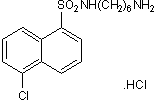W-7 hydrochloride
Chemical Name: N-(6-Aminohexyl)-5-chloro-1-naphthalenesulfonamide hydrochloride
Purity: ≥98%
Biological Activity
W-7 hydrochloride is a calmodulin antagonist. Inhibits Ca 2+ -calmodulin-dependent phosphodiesterase (IC 50 = 28 μM) and myosin light chain kinase (IC 50 = 51 μM).Technical Data
The technical data provided above is for guidance only.
For batch specific data refer to the Certificate of Analysis.
Tocris products are intended for laboratory research use only, unless stated otherwise.
Background References
-
Direct interaction of calmodulin antagonists with Ca2+/calmodulin-dependent cyclic nucleotide phosphodiesterase.
Itoh and Hidaka
J.Biochem., 1984;96:1721 -
N-(6-aminohexyl)-5-chloro-1-naphthalenesulfonamide, a calmodulin antagonist, inhibits cell proliferation.
Hidaka et al.
Proc.Natl.Acad.Sci.U.S.A., 1981;78:4354 -
Hydrophobic regions function in calmodulin-enzyme(s) interactions.
Tanaka and Hidaka
J.Biol.Chem., 1980;255:11078 -
Divergent pharmacological effects of three calmodulin antagonists, N-(6-aminohexyl)-5-chloro-1-naphthalenesulfonamide (W 7), chlorprom. and calmidazolium, on isometric tension development and myosin light chain phosphorylation in intact bovine trachea
Asano et al.
J.Pharmacol.Exp.Ther., 1989;251:764 -
Test: High throughput screening on sections from the rat nervous systems
Product Datasheets
Reconstitution Calculator
Molarity Calculator
Citations for W-7 hydrochloride
The citations listed below are publications that use Tocris products. Selected citations for W-7 hydrochloride include:
16 Citations: Showing 1 - 10
-
Ketamine exerts its sustained antidepressant effects via cell-type-specific regulation of Kcnq2.
Authors: Lopez Et al.
Neuron 2022;110:2283
-
P38 inhibition reverses TGFβ1 and TNFα-induced contraction in a model of proliferative vitreoretinopathy.
Authors: Schiff Et al.
Commun Biol 2019;2:162
-
The Actin Nucleator Cobl Is Critical for Centriolar Positioning, Postnatal Planar Cell Polarity Refinement, and Function of the Cochlea.
Authors: Haag Et al.
Cell Rep 2018;24:2418
-
Histone deacetylase 6 inhibition reduces cysts by decreasing cAMP and Ca(2+) in knock-out mouse models of polycystic kidney disease.
Authors: Yanda Et al.
J Biol Chem 2017;292:17897
-
Voltage Dependence of a Neuromodulator-Activated Ionic Current.
Authors: Gray and Golowasch
Eneuro 2016;3
-
Protein kinase G-regulated production of H2S governs oxygen sensing.
Authors: Yuan Et al.
Sci Signal 2015;8:ra37
-
Rapid dispersion of SynGAP from synaptic spines triggers AMPA receptor insertion and spine enlargement during LTP.
Authors: Araki Et al.
J Neurosci 2015;85:173
-
Calcium signals inhibition sensitizes ovarian carcinoma cells to anti-Bcl-xL strategies through Mcl-1 down-regulation.
Authors: Bonnefond Et al.
J Biol Chem 2015;20:535
-
The Actin Nucleator Cobl Is Controlled by Calcium and Calmodulin.
Authors: Hou Et al.
Apoptosis 2015;13:e1002233
-
Dimerisation of the Drosophila odorant coreceptor Orco.
Authors: Mukunda Et al.
Neuron 2014;8:261
-
Areca nut-induced buccal mucosa fibroblast contraction and its signaling: a potential role in oral submucous fibrosis--a precancer condition.
Authors: Chang Et al.
Psychopharmacology (Berl) 2013;34:1096
-
The calcium signaling pathway regulates leydig cell steroidogenesis through a transcriptional cascade involving the nuclear receptor NR4A1 and the steroidogenic acute regulatory protein.
Authors: Abdou Et al.
Endocrinology 2013;154:511
-
Small molecule inhibitors of the Candida albicans budded-to-hyphal transition act through multiple signaling pathways.
Authors: Midkiff Et al.
PLoS One 2011;6:e25395
-
Phospholipase C, Ca2+, and calmodulin signaling are required for 5-HT2A receptor-mediated transamidation of Rac1 by transglutaminase.
Authors: Dai Et al.
Front Cell Neurosci 2011;213:403
-
Dihydrotestosterone stimulates aldosterone secretion by H295R human adrenocortical cells.
Authors: Yanes and Romero
Mol Cell Endocrinol 2009;303:50
-
Nerve Terminal GABAA Receptors Activate Ca2+/Calmodulin-dependent Signaling to Inhibit Voltage-gated Ca2+ Influx and Glutamate Release.
Authors: Long Et al.
Carcinogenesis 2009;284:8726
FAQs
No product specific FAQs exist for this product, however you may
View all Small Molecule FAQsReviews for W-7 hydrochloride
There are currently no reviews for this product. Be the first to review W-7 hydrochloride and earn rewards!
Have you used W-7 hydrochloride?
Submit a review and receive an Amazon gift card.
$25/€18/£15/$25CAN/¥75 Yuan/¥2500 Yen for a review with an image
$10/€7/£6/$10 CAD/¥70 Yuan/¥1110 Yen for a review without an image

